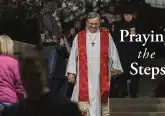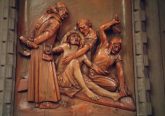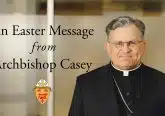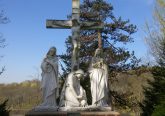Archbishop discusses ‘The Nature of a Parish’
Wednesday, March 10, 2010
ST. MARGARET MARY DEANERY — There are five elements that make a parish truly viable, Archbishop Dennis M. Schnurr told a group of Catholics March 6: The parish must celebrate the Mass and sacraments; it has to have a solid and effective religious education program; it must have a solid and effective youth ministry program; it must seek to perpetuate itself by fostering vocations; and it must be able to meet its financial concerns and obligations.
Speaking on “The Nature of a Parish” to a group of some 75 persons at St. Vivian Church, the archbishop said he arrived at that list while serving as Bishop of Duluth. “There was discussion of establishing a new parish, and it was suggested I put together some thoughts,” he explained. He came to a determination of “which elements need to be in place to insure that it’s truly a vibrant parish that can continue Christ’s ministry on earth.”
 |
| About 75 persons turned out to hear the archbishop speak about the nature of a parish. (CT/Tony Tribble) |
With regard to celebration of the sacraments, Archbishop Schnurr said the use of the word “celebration” is deliberate. Too many Catholics state,“I go to church every Sunday,” and that’s all that happens — they don’t celebrate, he said.
A religious education program in a parish must be aimed at persons of all ages, not just the young, he added. “Learning about faith is a lifelong journey. Myself — I’ve been ordained 23 years, and I certainly wouldn’t claim I know all about what the church teaches.”
He went on to explain that many people look at the teachings of Christ “like it’s something we memorize to help us be good. But . . . Christ’s teachings tell us who we are.”
“Left to ourselves, we don’t have the strength, the knowledge — that’s why we have sacraments. The sacraments are there at very critical moments in our lives. The sacraments give us the insights we need to understand the word.”
The very early Christians didn’t refer to their community as “Catholic Christians,” he said. “They referred to it as ‘The Way.’ They continued what Christ did in His ministry. It’s why at the beginning of every Mass we have the readings from Scripture, we hear the voice of Christ speaking to us, we reflect upon it.”
The reason for the very existence of the parish is because “no one can make the journey alone,” he said. “It’s sad that some parishioners never get involved in their parish in any way. They are cheating themselves.” He referred to the parable of the landowner who entrusts his servants with talents and expects them to be put to use in his absence.
“The message for all of us when we talk about the parish is that there can be no such thing as status quo. God is always asking something of us. What did I contribute in time and talent? Can we honestly say a parish has been better because I’m a part of it?”
Archbishop Schnurr said it’s not a pastor’s responsibility to make the parish what it should be. Rather, the pastor needs to recognize talents and call them forward.
He believes progress has been made in recent decades. “No one would think about building a church today without including a gathering space. That shows an awareness that we can’t just be going to church and going home. We’re beginning to understand faith must be lived out. We need to get to know one another, and then someone else can recognize our gifts, too. This is where a gathering space can be very helpful,” he explained.
When he referred to a parish perpetuating itself through vocations, he emphasized that he used the word vocations “in the broadest sense: priesthood, marriage, diaconate, religious life, chaste single life.” A parish is the place where people must be discerning how God calls them to serve, he said.
Parishes must “single out our children and young people,” Archbishop Schnurr added. “We must wish to convey our faith to children and to future generations. It is our responsibility to see that the faith is as rich within their lives as it has been in ours.” His own experience has shown him that age-appropriate retreat experiences are one of the best ways of doing this.
In a question-and-answer period that followed, Archbishop Schnurr spoke candidly about the role of parish councils and offered his own optimistic viewpoint of local vocations, specifically to the permanent diaconate and priesthood.













